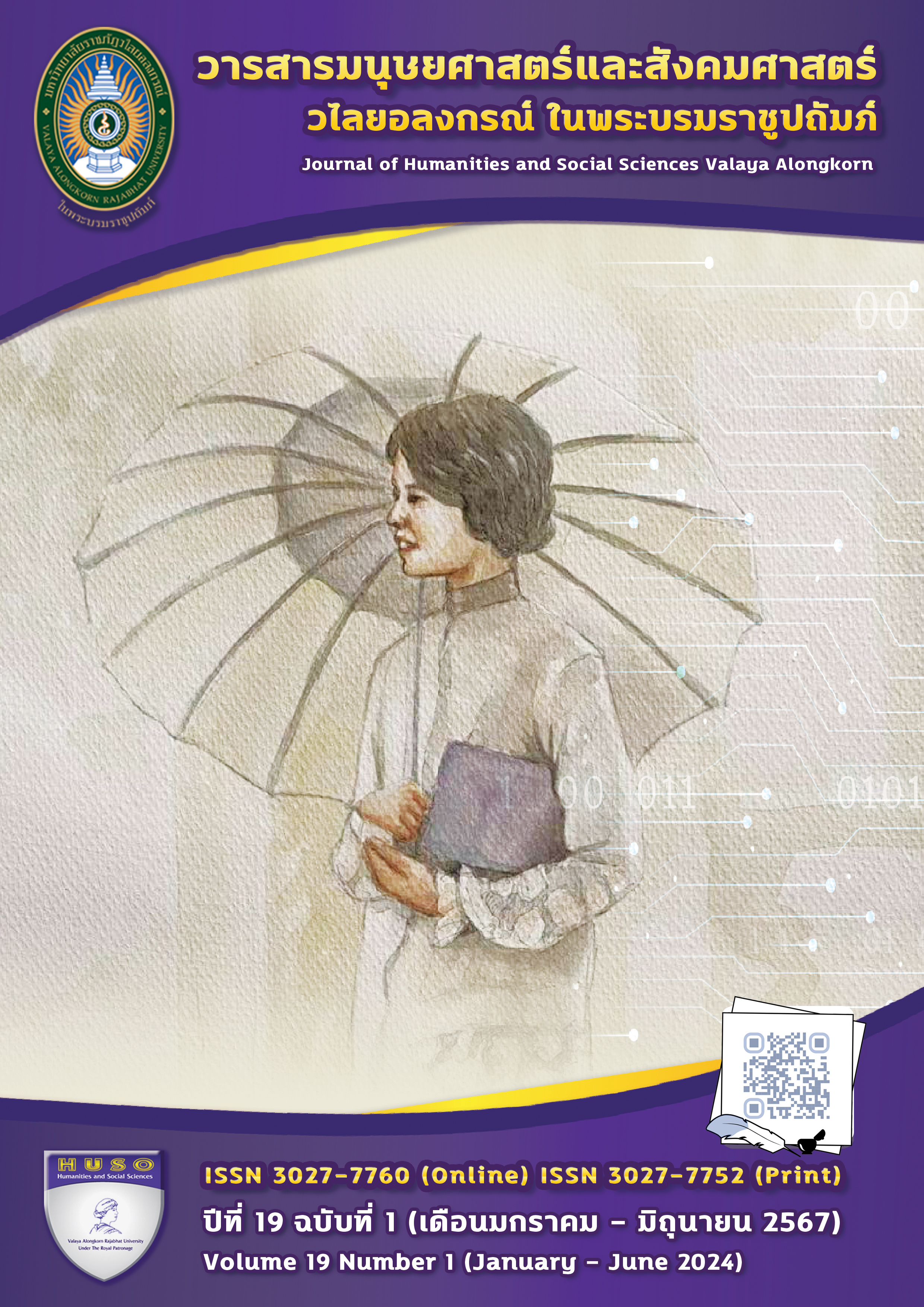DETERMINATION OF CRIMINAL OFFENSES AGAINST MONKS UNDER THE PENAL CODE
Main Article Content
Abstract
Buddhism has been with Thai society for a long time, with monks propagating the teachings of the Buddha, who is the teacher of Buddhism. Monks are therefore like representatives of Buddhism. Buddhist monks must be good role models and dedicate themselves as propagators of Buddhism for Buddhists to follow. However, it appears that criminal offenses are now often committed by monks, as often seen in the news. Although the actions of these monks are considered violations of monastic discipline, the punishment is only disqualification from the priesthood and the same criminal penalties as ordinary people. There is no criminal law that directly applies to monks who commit criminal offenses. There are only criminal offenses that any person can commit. In the current Criminal Code, religious offenses are merely provisions intended to punish those who harm their religion. There is no punishment provision specifically for monks, even though a monk's offense is serious because the monk is considered a person of high status and trust in society. It may be compared to a specialized professional or an officer. Monks must be more careful with their behavior than the general public. When a monk becomes an offender, it causes problems for society. Dharmavinaya are only moral criteria without any compulsory conditions, unlike criminal enforcement under civil law that can control monks from committing crimes. Therefore, there should be a way to punish these monks more severely than ordinary people. In this research, the authors studied concurrent monastic and criminal measures. The results showed that it is necessary to impose additional penalties on monks who commit offenses under the Criminal Code, particularly property offenses and sexual offenses such as rape, which are now often committed by monks.
Article Details

This work is licensed under a Creative Commons Attribution-NonCommercial-NoDerivatives 4.0 International License.
ลิขสิทธิ์บทความวิจัยที่ได้รับการตีพิมพ์เผยแพร่ในวารสารมนุษยศาสตร์และสังคมศาสตร์ วไลยอลงกรณ์ ในพระบรมราชูปถัมภ์ ถือเป็นกรรมสิทธิ์ของคณะมนุษยศาสตร์และสังคมศาสตร์ มหาวิทยาลัยราชภัฏวไลยอลงกรณ์ ในพระบรมราชูปถัมภ์ ห้ามนำข้อความทั้งหมดหรือบางส่วนไปพิมพ์ซ้ำ เว้นแต่จะได้รับอนุญาตจากมหาวิทยาลัยเป็นลายลักษณ์อักษร
ความรับผิดชอบ เนื้อหาต้นฉบับที่ปรากฏในวารสารมนุษยศาสตร์และสังคมศาสตร์ วไลยอลงกรณ์ ในพระบรมราชูปถัมภ์ เป็นความรับผิดชอบของผู้นิพนธ์บทความหรือผู้เขียนเอง ทั้งนี้ไม่รวมความผิดพลาดอันเกิดจากเทคนิคการพิมพ์
References
เกียรติขจร วัจนะสวัสดิ์. (2549). คำอธิบายกฎหมายอาญา ภาค 1 พิมพ์ครั้งที่ 9. จิรรัชการพิมพ์.
เกียรติขจร วัจนะสวัสดิ์. (2554). ประมวลกฎหมายกฎหมายอาญามาตรา 18 บัญญัติ. จิรรัชการพิมพ์.
คณิต ณ นคร. (2549). กฎหมายอาญาภาคความผิด พิมพ์ครั้งที่ 9. วิญญูชน.
เด่นเดือน เชษฐสมุน. (ม.ป.ป.) การดำเนินคดีกับเจ้าพนักงานตามประมวลกฎหมายอาญา มาตรา 157
พระพรหมคุณากรณ์. (2555). นิติศาสตร์แนวพุทธ พิมพ์ครั้งที่ 13. วิญญูชน,
พระราชบัญญัติธุรกิจสถาบันการเงิน พ.ศ. 2551 มาตรา 140-147. (2551, 5 กุมภาพันธ์). เล่ม 125 ตอนที่ 27 ก.
หน้า 1-58.
ทวีพร คงแก้ว. (2553). เหตุฉกรรจ์ในความผิดฐานทำร้ายร่างกาย. [วิทยานิพนธ์ปริญญามหาบัณฑิต
ไม่ได้ตีพิมพ์], บัณฑิตวิทยาลัย จุฬาลงกรณ์มหาวิทยาลัย.
ข้อบังคับสภาวิชาชีพ (ฉบับที่ 19) เรื่องจรรยายบรรณของผู้ประกอบวิชาชีพบัญชี พ.ศ. 2553 ข้อ 27,28.
รายงานวิจัย โครงการวิจัยพุทธศาสน์ศึกษาศูนย์พุทธศาสน์ศึกษา จุฬาลงกรณ์หมาวิทยาลัย, 2552.
รายงานการวิจัย ภาควิชาปรัชญาและศาสนา คณะวิชามนุษยศาสตร์และสังคมศาสตร์ วิทยาลัยครูสงขลา, 2531.
วารสารวิจัยธรรมศึกษา ปีที่ 5 ฉบับที่ 1 ศูนย์วิจัยธรรมศึกษา สำนักเรียนวัดอาวุธวิกสิตาราม, 2565.
อำนวย ยัสโยธา. (2531). กระบวนการต้องโทษในประมวลกฎหมายอาญากับวินัยสงฆ์ การศึกษาเชิงเปรียบเทียบ.
รายงานการวิจัย ภาควิชาปรัชญาและศาสนา คณะวิชามนุษยศาสตร์และสังคมศาสตร์
วิทยาลัยครูสงขลา.
กลุ่มวิชาการพระพุทธศาสนาและจริยศึกษา ศาสนาศึกษา กรมศาสนาศึกษา กระทรวงศึกษาธิการ. (2541).
อธิบายวิชาวินัยสำหรับนักธรรมชั้นโท พิมพ์ครั้งที่ 2. โรงพิมพ์การศาสนา
ข้อบังคับสภาวิชาชีพ. (2553). เรื่องจรรยายบรรณของผู้ประกอบวิชาชีพบัญ. (ฉบับที่ 19). ข้อ 27,28
พณิดา กันทะเขียว. (2565, 9 กรกฎาคม) ความสัมพันธ์ระหว่างศาสนากับการดำเนินชีวิต.
https://sites.google.com/site/ panidaple59/home
สถานทูตสหรัฐ ฯ และสถานกงสุลนประเทศไทย. (2565, 9 กรกฎาคม). รายงานว่าด้วยเสรีภาพทางศาสนา
นานาชาติในประเทศไทย 2563. https://th.usembassy.gov/th/our-relationship-th/official-
reports-th/2020-international-religious-freedom-report-thailand-th/
อมรินทร์ เทเลวิชั่น (2565, 22 กรกฎาคม). ฉาวแชทไลน์หลุดพระสงฆ์กับสีกา 26 เมษายน 2565.
https://www.amarintv.com/ news/detail/131715,สืบค้นวันที่ 25 กรกฎาคม 2565.
Herbert L. Packer. (1968). The limits of the criminal sanction. p.296.


